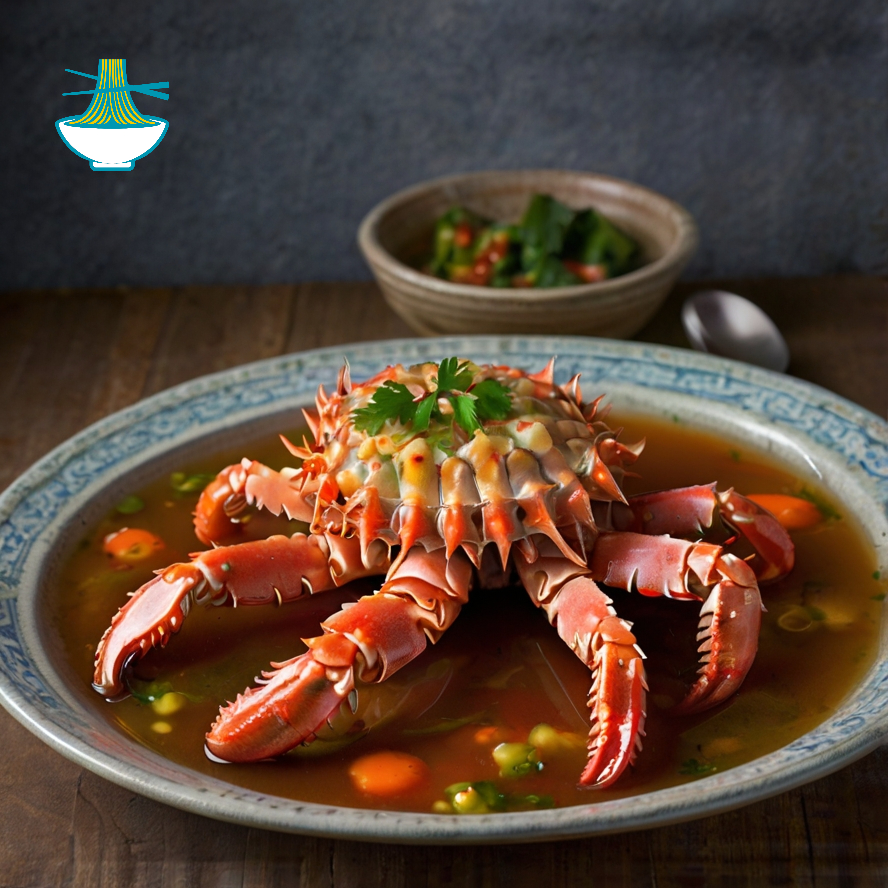Chilean centolla, also known as king crab, is a highly prized seafood delicacy from the pristine waters of southern Chile. Renowned for its sweet, succulent meat, this crab is often compared to lobster and is a favorite in gourmet dishes worldwide. Chilean centolla is celebrated for its rich flavor and tender texture, making it a sought-after ingredient for ceviche, soups, and stews. Its sustainable harvesting methods and nutrient-rich profile add to its appeal, making it a smart choice for eco-conscious and health-minded seafood lovers.

Chilean centolla has been a significant part of Chilean cuisine for centuries, with its origins tracing back to the indigenous peoples of the region who first discovered its culinary potential. Traditionally harvested by hand using artisanal methods, the centolla has become a symbol of Chilean coastal gastronomy. Today, it is appreciated globally for its exceptional taste and is a highlight in many high-end seafood restaurants.
Ingredients
- 1 whole Chilean centolla (king crab)
- 4 cups water
- 1 cup white wine
- 1 onion, diced
- 2 garlic cloves, minced
- 2 celery stalks, diced
- 2 bay leaves
Instructions
1. Clean the Centolla: Rinse the centolla thoroughly under cold running water. Use a stiff-bristled brush to scrub away any barnacles or debris from the shell.
2. Prepare the Broth: In a large pot, combine water, white wine, diced onion, minced garlic, celery, and bay leaves. Bring to a boil, then reduce the heat and let it simmer for about 10 minutes.
3. Steam the Centolla: Place the cleaned centolla in a steaming basket or colander and lower it into the pot. Cover with a tight-fitting lid and steam for about 20 minutes, or until the meat is fully cooked and tender.
4. Extract the Meat: Carefully remove the centolla from the pot and let it cool slightly. Using kitchen shears or a sharp knife, cut through the shell and extract the meat, removing any cartilage or tough bits.
5. Serve: Enjoy the centolla hot, with lemon juice, melted butter, or aioli for dipping.
Notes
- Choose a centolla that feels heavy and has a firm, unblemished shell.
- Handle with care, as the crab’s legs and claws can be sharp.
- If unsure about cleaning or extracting the meat, ask your fishmonger for assistance.
- Leftover centolla meat can be refrigerated and used in salads or sandwiches.
Nutrition Value:
1. 1 whole Chilean centolla (king crab)
- Calories: Approximately 100 calories per 3.5 ounces (100 grams)
- Carbohydrates: 0 grams
- Protein: 20 grams
- Fat: 1 gram
- Sodium: 500 milligrams
- Cholesterol: 70 milligrams
- Vitamins: Rich in Vitamin B12 and Vitamin C
- Minerals: High in selenium, zinc, and copper
- Nutritional Benefit: Centolla is a lean source of protein and low in fat. It is rich in essential minerals and vitamins, which support immune function, promote healthy blood cells, and aid in overall bodily functions.
2. 4 cups water
- Calories: 0 calories
- Carbohydrates: 0 grams
- Protein: 0 grams
- Fat: 0 grams
- Sodium: 0 milligrams
- Cholesterol: 0 milligrams
- Vitamins: 0 vitamins
- Minerals: May contain trace minerals depending on the source
- Nutritional Benefit: Water is essential for hydration, helps regulate body temperature, and supports various metabolic processes.
3. 1 cup white wine
- Calories: Approximately 120 calories
- Carbohydrates: 4 grams
- Protein: 0 grams
- Fat: 0 grams
- Sodium: 10 milligrams
- Cholesterol: 0 milligrams
- Vitamins: Contains small amounts of vitamins B6 and B12
- Minerals: Contains trace amounts of potassium and magnesium
- Nutritional Benefit: White wine can enhance flavor and aroma, though it is not a significant source of nutrients. It also contributes to the overall taste profile of the dish.
4. 1 onion, diced
- Calories: Approximately 45 calories per medium onion
- Carbohydrates: 11 grams
- Protein: 1 gram
- Fat: 0 grams
- Sodium: 4 milligrams
- Cholesterol: 0 milligrams
- Vitamins: Good source of Vitamin C and Vitamin B6
- Minerals: Contains potassium, calcium, and magnesium
- Nutritional Benefit: Onions are rich in antioxidants and have anti-inflammatory properties. They support heart health and help with digestion.
5. 2 garlic cloves, minced
- Calories: Approximately 9 calories per clove
- Carbohydrates: 2 grams
- Protein: 0.4 grams
- Fat: 0 grams
- Sodium: 1 milligram
- Cholesterol: 0 milligrams
- Vitamins: Contains small amounts of Vitamin B6 and Vitamin C
- Minerals: Contains manganese, calcium, and phosphorus
- Nutritional Benefit: Garlic has strong anti-inflammatory and antioxidant properties. It supports cardiovascular health and boosts the immune system.
6. 2 celery stalks, diced
- Calories: Approximately 10 calories per stalk
- Carbohydrates: 2 grams
- Protein: 0.5 grams
- Fat: 0 grams
- Sodium: 40 milligrams
- Cholesterol: 0 milligrams
- Vitamins: Good source of Vitamin K and Vitamin A
- Minerals: Contains potassium and calcium
- Nutritional Benefit: Celery is low in calories and rich in fiber. It supports digestive health and provides essential vitamins and minerals for overall wellness.
7. 2 bay leaves
- Calories: Approximately 5 calories per leaf
- Carbohydrates: 1 gram
- Protein: 0 grams
- Fat: 0 grams
- Sodium: 0 milligrams
- Cholesterol: 0 milligrams
- Vitamins: Contains Vitamin A and Vitamin C
- Minerals: Contains iron and calcium
- Nutritional Benefit: Bay leaves add flavor and aroma. They also have digestive benefits and are used in traditional medicine for their anti-inflammatory and antioxidant properties.


Comments